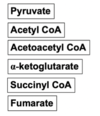Amino acid metabolism Flashcards
(30 cards)
What can’t happen when there is excess amino acids?
- They can’t be stores
- They aren’t secreted
What happens when there are excess amino acids in the body?
Tell me the amount in g/day that are used?

Whats the final destination for the AA in pool?
- protein synthesis
- direct use/ minor modification
- Breakdown and redeployment
AA can be used as neurotransmitters. Name some neurotransmitters
- glutamate
- aspartate
- glycine
What neurotransmitters are the following AA turned into?
- Glutamate
- Tyrosine
- Tryptophan
- Arginine
- glutamate –> GABA
- Tyrosine –> Dopamine, noradrenaline, adrenaline
- Tryptophan –> Serotonin
- Arginine –> NO
What hormones do the following AA produce
- Tyrosine
- Tryptophan
Tyrosine –> Thyroxine
Tryptophan –> melatonin
Draw the process of how a carbon skeleton is formed from an amino acid?
What can the carbon skeleton be used for?

Draw the reaction, including intermediates, of how most AA form urea?
What is the name of the processes?
- Transferring amino group from the AA onto something else like alpha-ketoglutarate to then form glutamate
- Kidney then converts ammonia –> urea
- Can reuse alpha ketoglutarate

Draw the overall process of transamination and the enzyme used?

Is there energy use in the process of transamination?
No
What does it mean if the enzyme AST is present in the blood?
Then it indicates liver damage
What does aminotransferase use to do the amino group transfer
Aminotransferases use a Vit B6-derived prosthetic group called Pyridoxal phosphate (PLP) to do the amino group transfer
- ping-pong mechanism where the substrates don’t meet
- Reaction can go in either direction

How are amino groups funnelled into Glu removed?
deamination
Whats the process of deamination?

Whats the process of urea synthesis ?

Draw the urea cycle and the structures

Draw the overall formation of urea and the overall energy cost

What do extrahepatic tissues do?
Give an example
Catabolise AA to NH3, but can’t make urea
e.g. BCAA (branch chain AA) catabolism for energy in muscles
Complete the following reactions
- alpha-KG + NH3 –>
- Glu + NH3 –>
- Alpha-KG + NH3 –> Glu
- Glu + NH3 –> Gln (export of 2 amino into the blood)
In the kidney, what can Gln be deaminated back to
Glu to release NH3 into the urine for acid neutralisation
What can carbon skeletons all end up as according to the starting amino acid ?

How is sulphur disposed of?

What are the transamination reactions for Cys and Cysteinesulphnate?
How is SO2 and H2S removed?

What does synthesising de novo mean?
De novo synthesis refers to the synthesis of complex molecules from simple molecules such as sugars or amino acids, as opposed to recycling after partial degradation



